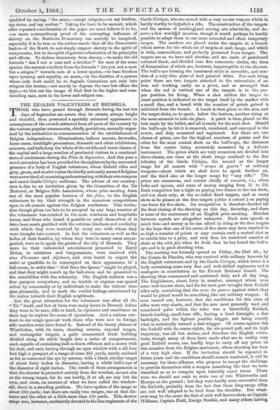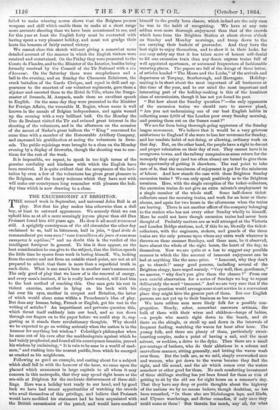THE ENGLISH VOLUNTEERS AT BRUSSELS.
THOSE who have passed through Brussels during the last ten days of September are aware that its streets, always bright and cheerful, then presented a specially animated appearance in consequence of the crowds attracted from all parts of the country by the various popular amusements, chiefly gratuitous, annually organ- ized by the authorities in commemoration of the establishment of Belgian independence. Illuminations, balloon ascents, fireworks, horse races, torchlight processions, dramatic and other exhibitions, concerts, and balls keep the whole of the middle and lower classes of the capital and a large number of provincial visitors in a continual state of excitement during the Fetes de Septenibre. And this year a novel attraction has been provided for the sightseersby the unwonted presence of a body of English volunteers, whose Enfield rifles and grey, green, and scarlet tunics the kindly and easily amused Belgians were never tired of examining and contrastin g with their own weapons sind smart Garde Civique uniforms. The advent of our country- men is due to an invitation given by the Committee of the Tir National, or Belgian Rifle Association, whose prize meeting form one of the most popular features of the flies, to the English volunteers to try their strength in the numerous competitions open to all comers against the Belgian marksmen. This invita- tion though given too late to be accepted by any large number of the volunteers was couched in the most courteous and hospitable terms, and those who found it possible to avail themselves of it have been much gratified with the extreme kindness and cordiality with which they were received by every one with whom they were brought into contact. In fact the volunteers as well as the ladies of their families, by. whom they were in many cases accom- panied, were so to speak the guests of the city of Brussels. They were to their unbounded astonishment presented to Royal Dukes, to ministers and burgomasters, were received with vins d'honneur and -dejefiners, and even learnt to expect the waltz or quadrille to be interrupted on their appearance in- a ball-room, in order that " God Save the Queen" might be played, and that they might march up the ball-room and be presented to the notabilities with due solemnity. The English uniform was a free passport everywhere, and no trouble or expense was spared either by community or by individuals to make the visitors' time pass pleasantly, and to mark the cordial feelings entertained by the nation towards their English neighbours.
But the great attraction for the volunteers was after all the ." Tit." itself, and few of them were many hours in Brussels before they were to be seen, rifle in hand, in vigilantes and omnibuses on their way to explore the scene of operations. And a curious con- trast to our rough open-air work those who were new to foreign rifle matches must have found it. Instead of the breezy plateau of Wimbledon, with its tents, shooting screens, exposed ranges, and rectangular targets, a gaily ornamented brick building divided along its whole length into a series of compartments, each capable of containing half-a-dozen riflemen and a scorer with his desk, and each having through an open window with a sill four feet high a prospect of a range of some 250 yards, nearly enclosed as far as concerned the eye by screens, with a black circular target of about forty inches in diameter, having a white bull's-eye of the diameter of eight inches. The result of these arrangements is that the shooter is protected entirely from the weather, cannot aim at the wrong target, for he can hardly, if at all, see any but his own, and must, on account of what we have called the window- aill, shoot in a standing position. We have spoken of the range as about 250 yards; but there are really two ranges, one at that dis- tance and the other at a little more than 100 yards. This shorter range was, however, exclusively devoted to the line regiments of the
Garde Civique, who are armed with a very co.trse weapon which is hardly worthy to be:called a rifle. The construction of the targets and the system of marking l and scoring are adnfrable, and de- serve a few words:of mention, though it would perhaps be hardly possible to adapt them to our more extended and often temporary ranges. The markers are placed under the targets in a trench which serves for the whole set of targets at each range, and which is wide, commodious, and perfectly protected from danger. The targets are as we have said circular, and are made of pasteboard coloured black, and divided into five concentric circles, the lines of demarcation of which are, however, imperceptible to the shooter. The bull's-eye forming the innermost circle is moveable, and con- sists of a very thin plate of lead painted white. For each firing point there are two targets attached to the extremities of an iron rod working easily on a pivot, and so arranged that when the rod is vertical one of the targets is in the pro- per position for firing. When a shot strikes the target its exact position is indicated on the target itself by the marker with a small disc, and a board with the number of points gained is exhibited from the trench. A touch is then given to the arm, and the target sinks, so to speak, below the horizon, another rising at the same moment to take its place. A patch is then placed on the hole made by the bullet, and all is ready for the next shot. Should the bull's-eye be hit it is removed, numbered, and conveyed to the scorer, and duly measured and registered. For there are two classes of prizes, one for the highest numbers of points and the other for the most central shots on the bull's-eye, the distances from the centre being accurately measured by a delicate instrument. The prizes which are vary numerous are divided into three classes, one class at the short, range confined to the line infantry of the Garde Civique, the second at the longer range for all comers with "arises de guerre" or military weapons—about which we shall have to speak further on, and the third also at the longer range for "any rifle." The prizes are numerous, and consist chiefly of couverls, i.e., silver forks and spoons, and sums of money ranging from 1/. to 20/. Each competitor has a right on paying two francs to fire ten shots, and ten shots only, at the so-called fixed targets, and as many shots as he pleases at the free targets (elides a volow) on paying one franc for five shots. No competition is therefore decided till the final closing of the shooting on this day, Saturday, and there is none of the excitement of an English prize meeting. Matches between squads are altogether unknown. Each man spends as much time and money as he can afford in firing at the free targets in the hope that one of his series of five shots may have resulted in so high a number of points or may contain such a central shot as to entitle him to a prize, and only fires his restricted number of shots at the tilde fire when he finds that he has found the bull's- eye and is in good shooting trim.
The meeting was formally opened on Friday, the 23rd ult., by the Comte de Flandre, who was received with military honours by the English volunteers and by the Garde Civique, which latter is a body containing some very fine and well-drilled regiments and is analogous in constitution to the French National Guard. The shooting then commenced and continued daily and all day long. The Englishmen, about forty in number, amongst whom were some well-known shots, had for the most part brought their Enfold rifles only, conceiving that the arm du guerre against which they would be pitted would be something like our military weapon. It soon turned out, however, that the conditions for this class of rifles were very elastic, and that the arm most generally used and considered quite within the rules was a beautifully finished, breech-loading, small-bore rifle, having a bead foresight, a fine bpeksight, and the lightest possible trigger, not being exactly what is technically termed a hair-trigger. Of course against this
the Enfield with its coarse sights, its six-pound pull, and its high trajectory, was all but useless, and therefore the English volun- teers, though many of them have made what are in reality very good Enfield scores, can hardly hope to carry off any prizes on this occasion from the Belgian marksmen, whose shooting has been of a very high class. If the invitation should be repeated in future years and the conditions should remain unaltered, it will be necessary for those riflemen who propose to accept the challenge to provide themselves with a weapon something like that we have
described so as to compete upon tolerably equal terms. There were we should not omit to state one or two Whitworths and Henrys on the ground ; but they were hardly more successful than the Enfields, probably from the fact that these long-range rifles are not well adapted to be fired from the shoulder. But what- ever may be the cause the fact of such well-known shots as Captain Williams, Captain Field, Ensign Stockie, and many others having
failed to make winning scores shows that the Belgians possess weapons and skill which enable them to make at a short range more accurate shooting than we have been accustomed to see, and for this year at least the English forty must be contented with having spent a very pleasant holiday, and must not grudge their hosts the honours of fairly earned victory.
We cannot close this sketch without giving a somewhat more detailed account of the manner in which the English visit= were received and entertained. On the Friday they were presented to the Comte de Flandre, and to the Minister of the Interior, besides being formally received by the Council of the Tir National with a via d'honneur. On the Saturday there were steeplechases and a ball in the evening, and on Sunday the Chasseurs Eclaireurs, the crack battalion of the Garde Civique, and equal in drill and ap- pearance to the smartest of our volunteer regiments, gave them a dejefiner and escorted them to the Hotel de Ville, where the Burgo- master of Brussels, M. Anspach, made them an excellent speech in English. On the same day they were presented to the Minister for Foreign Affairs, the venerable M. Rogier, whose name is well known in the annals of Belgian independence, and again wound up the evening with a very brilliant ball. On the Monday the Due de Brabant visited the Tir and evinced great interest in the shooting of the volunteers, and in the afternoon on the occasion of the ascent of Nadir's great balloon the " King " conversed for some time with a member of the Honourable Artillery Company, and expressed his gratification at seeing the volunteers in Brus- sels. The public rejoicings were brought to a close on the Monday evening by a display of fireworks, though the shooting was to con- tinue for the rest of the week.
It is impossible, we repeat, to speak in too high terms of the genuine cordiality and kindness with which the English have been received. It is quite evident that the acceptance of the invi- tation by even a few of the volunteers has given great pleasure to the Belgians, and the hearty welcome which they have met with will make our countrymen long remember with pleasure the holi- day time which is now drawing to a close.































 Previous page
Previous page